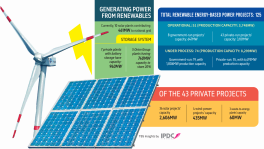Khushi Kantha: Connecting Dinajpur to the UK, how a social enterprise embroiders empowerment
A social enterprise based in the United Kingdom employs women in rural Dinajpur to stitch traditional blankets, and in the process improve their livelihoods

When Laura Rana's in-laws sent her 30 traditional baby 'kantha' [blankets] after her half-British, half-Bangalee twin daughters, Opi and Mahi were born in July 2019, she wondered what to do with them. "But actually, they had so many practical uses, from play mats to pram liners," she said.
Many people would stop Laura Rana on the way to ask about the eye-catching, bright-coloured blankets as opposed to the pastel-coloured ones which are more common in the United Kingdom. The popularity of the blankets got Laura thinking about how they could lead to a feasible business that is not solely driven by profit.
She shared, "I've always dreamed of using everything I've experienced and learned to start my own initiative, working directly with women whose position I could be in if circumstances were different."
And thus, by employing women in rural Dinajpur to work and stitch blankets, tote bags and other accessories, her social enterprise Khushi Kantha (Happy Blankets), was born in November 2020.
Dinajpur
The blankets are hand-stitched in the village of Dangapara in Dinajpur. Laura's sister-in-law, Rowsa works as the head of production; she trains and supervises mothers who make blankets. And her brother-in-law, Mahedi, looks after production.
Traditionally the blankets that our grandmothers/mothers make from old sharis or clothes accompany newborns in our homes. But these happy blankets have already been sold in Canada, Australia and many European countries via online platforms.

She explained, "We are reworking the kantha technique in order to meet European safety standards for baby quilts – we can't use second hand sharis in the traditional approach because this doesn't meet the standards. But we want to maintain the kantha principles of 'reclaim-repurpose-reuse' as much as possible."
While old sharis form the inside layers of the blankets, the outside layers are made from waste cotton fabric from Bangladeshi garment factories.
To maintain this process, they are partnering with sustainability focused brands like Prabartana – a brand that promotes handloom fabrics, crafts, arts and ecological lifestyles.
They source the hand-dyed, hand-woven cotton for the outside layers of the blankets from Prabartana and then they dye the fabric according to their custom colour palette, which is named after the mothers who make the blankets and their children.
Bright colour palettes like yellow, cobalt blue and orange are named after Asha, Suraiya and Sumi – the working mothers.
The mothers who stitch the blankets are able to use their skills to earn an income in a way that is flexible around their childcare and household commitments.
Among the mothers, Anufa is one. She is the sole provider for her son and her mother who lives in the village of Dangapara. By partnering with Khushi Kantha, she has been able to meet her family's daily needs.
She said, "Everyone needs to change their perspective about women so that our female community can develop."

Khushi Kantha employs eight mothers in Dinajpur.
And the team pays more than 1.3 times the minimum wage paid to RMG sector workers in the city. And, using a simplified version of the globally recognised Anker Methodology (a widely accepted and published new methodology to estimate living wages that is both internationally comparable and locally specific), these mothers are paid nearly 1.5 times the local living wage (estimated to be Tk8,080 per month in 2018).
Through a rewards-based crowdfunding campaign, they had launched their first collection (crowdfunder.co.uk/khushikantha) in April 2021 and soon enough the blankets received a very good response from the crowd.
With the soaring popularity of the blankets, Laura introduced a personalised option where the customers can customise them with their baby's name and date of birth.
Laura Rana and Bangladesh
With her background in international development, Laura has spent 10 years working with organisations such as Save the Children and the Red Cross in Bangladesh. It was during her humanitarian work in the country that she got introduced to and eventually married her Bangladeshi spouse.
Laura wanted to tap into her knowledge of the local communities in Bangladesh to create a product with a positive impact. Specifically, she hoped to employ Bangladeshi women to continue the longstanding Bangalee tradition of making blankets out of repurposed sharis.

Laura spent the first half of her pregnancy working on the humanitarian responses to the Rohingya refugee crisis in Cox's Bazar. "I was overwhelmed by the compassion and generosity of the mothers from the communities hosting the refugees, who had welcomed nearly one million Rohingya men, women and children, fleeing Myanmar, with open arms, despite struggling to provide for their own families."
She was amazed by the strength and spirit of Bangladeshi women living under the poverty line. "When I became pregnant, I couldn't stop thinking about all the opportunities my daughters would have, compared to the children of the mothers all around me," she said.
Goals and principles
Laura wants to explore the wholesale opportunities to sell the blankets. And so, she aims for marketplaces that specialise in handmade, ethical and sustainable products and physical markets in London, along with their website.
Moreover, team Khushi Kantha does not only make blankets, but also make tote bags, pouch bags and more - all themed after the embroidery designs. This is how the team promotes the art of Bangladeshi embroidered kantha around the world.
Although they do not make any profit yet, they choose to be a social enterprise rather than operating as a charity. Laura believes that one needs to go beyond the individual household level for positive changes to be sustainable.
She further explained, "That's why we will be investing any profits we generate in strengthening the fabric of the community where our blankets are made, based on the needs of the mothers I'm partnering with.

I wanted to reinvest in the community and create a social enterprise where women would be paid a fair wage and have sustainable jobs they can do at home." That is why the money raised by selling the blankets is utilised for the mothers' wages, blanket production and maintaining the quality of the products.
She concluded, "We passionately believe that being financially self-sustaining is the most effective approach to achieving our goal of building better futures for the next generation."


 Keep updated, follow The Business Standard's Google news channel
Keep updated, follow The Business Standard's Google news channel
















